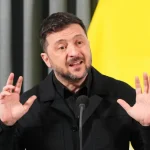
Former President Donald Trump has big plans for a second term in office, but exactly what those plans are is the subject of much debate.
Trump has been speaking of revenge and retribution for months, though the remarks are receiving more and more attention as polls find him besting not only GOP rivals but often President Joe Biden. To his critics, Trump is laying the groundwork to stretch the law or even become a full-fledged dictator.
BIDEN BEAT TRUMP ‘CHAOS’ IN 2020 — NOW NIKKI HALEY WANTS TO DO THE SAME
“In 2016, I declared, ‘I am your voice,'” Trump said at the Conservative Political Action Conference last March. “Today, I add, ‘I am your warrior. I am your justice. And for those who have been wronged and betrayed, I am your retribution.’”
Similar remarks have followed in the months since, such as Trump saying he’ll “root out” the “radical-left thugs that live like vermin within the confines of our country.”

Whether such talk is typical Trump hyperbole or a serious threat depends on one’s perspective. For Mike Davis, a former chief counsel to Sen. Chuck Grassley (R-IA) who has been rumored for attorney general in a new Trump administration, it smacks of hypocrisy.
“The same Democrats who impeached President Trump twice for nonsense, indicted him four times for non-crimes, tried to bankrupt his business, illegally gagged him twice, and are using a bogus legal theory to disqualify him from state ballots are suddenly concerned about a weaponized justice system?” Davis said.
“Trump supporters use hyperbole to point out that the Democrats’ lawfare and election interference is bad for our country,” he continued. “Biden and his Democrat allies are actually doing it.”
But some scholars, such as George Washington University political management professor Matt Dallek, say Trump should be taken seriously and that anyone who dismisses the severity of his remarks is making a mistake.
“He has clearly signaled that one of his chief motivations for running for office is to seek revenge — to punish his foes and protect himself from criminal prosecutions,” Dallek said. “The Trump campaign, and the institutions preparing for his return to power, strike me as far more sophisticated and organized than in 2017.”
If that’s the plan, staffing such an effort would still remain a major challenge even before it could be enacted. Personnel was a huge problem in the first Trump administration, with high turnover and frequent infighting, though Trump now claims to have better familiarity with Washington.
Outside efforts are also mounting, such as the Heritage Foundation’s Project 2025, which aims to help staff a future 2025 Republican administration. But Project 2025 is not tied to any one candidate, and efforts to reach its leaders for comment were unsuccessful.
Many of Trump’s strongest statements relate to the litany of criminal charges he’s facing himself, which he says should be focused instead on his opponents.
“I will appoint a real special prosecutor to go after the most corrupt president in the history of the United States of America, Joe Biden, and the entire Biden crime family,” Trump said in June. “I will totally obliterate the Deep State.”
The Justice Department has an active investigation, led by special counsel Robert Hur, into Biden’s handling of classified documents. A second special counsel, David Weiss, is prosecuting the president’s son, Hunter Biden, in Delaware and California on gun violations and tax fraud charges.
When Hunter Biden’s plea deal with the Justice Department on lesser charges famously fell apart over the summer, his attorneys were seeking broad immunity protections, citing, in part, concerns a future Trump administration would reopen the case against his rival’s son.
Conservatives such as Jenny Beth Martin say the dictator talk is baseless at best and a matter of projection at worst. To the extent that Trump will staff a White House with loyalists, she says he is simply performing a routine function of the job.
“Every president has the right to choose a team that aligns with their vision for the country,” Martin, honorary chairwoman of Tea Party Patriots Action, said. “It’s not about seeking revenge; it’s about executing the policies that the American people voted for.”
Joe Biden has had his own share of setbacks at the hands of Congress and the courts when he’s tried to set policy unilaterally.
His eviction moratorium, $400 billion student loan cancellation plan, and federal mask mandate were all overturned in court, and the administration is fighting a courtroom battle over allegations it engaged in illegal censorship with social media firms.
Perhaps Trump’s most famous comment in the dictator saga involved similar policy measures.
During an interview with Fox News host Sean Hannity, Trump said he’d be a dictator only on his first day in office.
“No, other than day one,” Trump said. “We’re closing the border, and we’re drilling, drilling, drilling. After that, I’m not a dictator.’”
On that score, Trump has released an extensive policy docket that includes a 10% tariff on foreign goods, impounding unspent government funds, and sentencing drug dealers to the death penalty. It’s these plans that his campaign says are important.
“The president has laid out a bold second term agenda ever since he announced over a year ago,” Trump campaign spokesman Steven Cheung recently told the Washington Post. “We have been transparent about what a second term would look like.”
Yet Trump’s hints at attacking political enemies are attracting much more controversy and even condemnation from some GOPers.
CLICK HERE TO READ MORE FROM THE WASHINGTON EXAMINER
Syracuse University political science professor Grant Reeher says he’s not convinced enough staffers would go along with true retribution plans if Trump did pursue them and notes that even a president would have difficulty ending all the Justice Department investigations taking place when he enters office.
“All of that doesn’t mean that these threats aren’t concerning or not to be taken seriously,” Reeher said. “But I think that the former president is stating what he’d like to do more than what he could actually carry out.”




